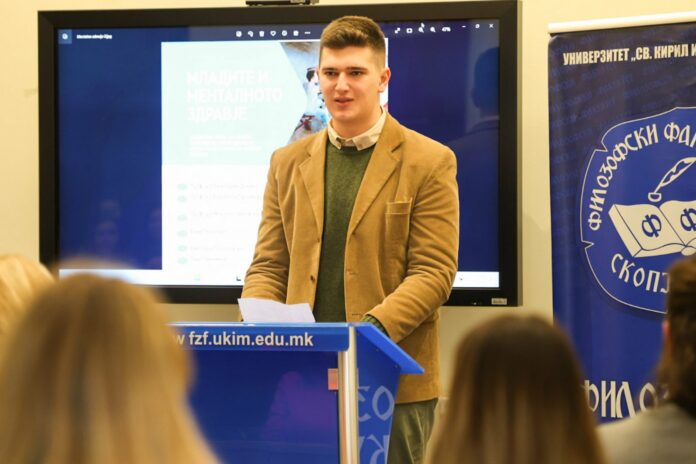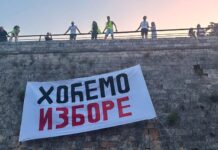ON THE OTHER SIDE OF THE DANUBE
At the beginning of the second semester, the media announced that as many as 140 – in words, one hundred and forty! – students from Stip and Kocani did not return to school following the end of the winter break. Why? Simply put, they, the same as 200,000 citizens before them in the last two decades, moved out of the country with their parents. They left Macedonia. Unfortunately, this news was not met with surprise or alarm by either the authorities or the general public. In the face of the harsh statistics, the entire region has in a way become indifferent to this trend, which, I believe, is present in all of the Balkan countries. Indeed, having one emigrant is a personal tragedy, but having thousands of them is a statistic! Are the (Western) Balkans a landfill of hopelessness?
by Luka Pavićević
I was asked the following question during a recent appearance on a news show on Sitel TV: In which country do I see my future? Instead of answering just from my personal perspective I talked about the multitude of young people that are literally taking on the responsibility of adults and trying to improve society. When these young people who are doing something for their country, and not waiting for their country to given them something, instead of being applauded and commended, are met with reproach, ridicule and insults, they decide to go abroad. Some of them will return; some won’t. Can we – all of us, the entire public – blame them for such a decision?
Two stereotypes about young people in the Balkans
A 2022 Survey by the Westminster Foundation for Democracy on socio-political participation of young people found that 51% of young people said they had taken an initiative to solve social problems, but as many as 70% rarely or never actually solved the problem. Therefore, no one should be surprised by the fact that if they meet 5 young people on the street, as many as 4 will say to them: “We do not believe that we have any influence on what or how the authorities do their work.”
This disillusionment with the system leads to the general perception in the Republic of North Macedonia that young people are apathetic and lazy without much interest in others or social developments. They are alienated to the point that they are interested in nothing but the fulfillment of their most basic, selfish needs. There is another prejudice that (some) young idealists live in an imaginary world and that their utopian ideas are impossible to realize.
Both perceptions are incorrect. Young people, first of all, are a very heterogeneous group whose character does not allow for generalization. Yes, as in any group, there are variations: some of them are uninterested, but I think we rarely talk about the young people who are tremendously active, serious and dedicated. Who fight passionately for their beliefs, and are not blinded by their idealism. In realistic terms, they know the problems in Macedonia very well and work on detailed plans to resolve them.
Youth initiatives, a vision for the future
It is not that few solutions have been offered to date. For example, the Youth Educational Forum (YEF) is a symbol of long-term work and dedication. It has existed for 24 years and provides non-formal education to over 1,000 young people every year. Recognizing the absence of critical thinking in the formal education system, the MF works to help young people develop analytical, research and communication skills through its debate clubs that exist in several cities in the country. Recently, young people have also been evolving their ability to evaluate sources through the integration of media literacy into the debate curriculum.
Two years ago, the Ekvalis Association prepared a Community Work Program that would require every student to be involved in volunteer activities during the school year. Community work is not only of a charitable nature, but allows students to develop into mature and well-rounded personalities. The revenge pornography scandal in the “Public Room” group before the pandemic shook the Macedonian public, but also revealed the need for adequate sex education so that adolescents know how to protect themselves. The HERA organization has created an entire curriculum for Comprehensive Sex Education, and the pilot project was successfully completed last year. Female high school students in Skopje declared war on the „pink tax“ and the City Council adopted an amendment to provide free menstrual products in schools, although in the end that did not happen.
Another injustice identified by young people is a selective approach to exercising the right to free public transport for schoolchildren and students. Namely, while those who attend a state educational institution automatically have this right, those attending private institutions do not, despite the fact that a significant number of these high school and college students are actually scholarship beneficiaries. For that reason, three students from a private college submitted an initiative to the Constitutional Court, which assessed the matter as unconstitutional, but there was no quorum at the session, so it was all in vain! But this struggle is continued by the student councils of private colleges and the Union of High School Students. Also, the Student Assembly of the Ss. Cyril and Methodius University (UKIM) managed to open a student cultural center.
Supporting the community service programs and free menstruation products in schools, the Union of High School Students – an organization I lead – has dedicated itself to several initiatives, two of which have been legislated. The union is actively fighting corruption in the education system: when we learned that certificates were illegally charged in four schools, we immediately reported it to the Inspectorate, and secured a refund to the students. We are not silent about classroom violence, and we have managed to achieve an increase in student scholarships. By writing a draft law on secondary school democracy, the Union aims to regulate and democratize student organizations for the first time in the country’s history. It envisions the creation of an independent student council in every high school in the country so as to help form conscious, informed individuals who, guided by a sense of duty, will participate in democratic life.
If we put education aside for a moment, it will become clear to us that young people have different ideas and needs as far as the labor market is concerned. The Institute for Good Governance and Euro-Atlantic Perspectives (IDUEP) organized a discussion as part of the project “What do young people want?” where young people and employers openly discussed the professions of the future. Furthermore, young craftspersons show that they are not only interested in profit, but are also concerned with preserving tradition, the interests of the community and sustainability in their business. Such an example is the social enterprise Esnaf, which offers handicrafts made by domestic designers, local crafters and people with disabilities. Similar broad-mindedness is also demonstrated by the bilateral offices for cooperation between Greece and North Macedonia, set up by the Youth Union – Krusevo with the aim of reconciliation and friendship between the two countries.
What kind of country would young people create?
I sincerely believe that the examples given show that young people truly have a vision of how to deal with social injustices and how to turn North Macedonia into a better place for living. However, they should do more to make us aware of the slowness and inexpediency displayed by the authorities. Slowness in decision-making is an excellent conservative principle if it comes out of prudence, but in our case it is abused as a delay mechanism while emigration continues…
At a public discussion in Parliament, my friend and MOF executive director Teodora Stolevska said that we need “urgent action by the legislative and executive branches. We need policies that are implemented consistently.” I fully share her opinion, but, unfortunately, my experience tells me that in our country a great deal often remains just as “words” on paper. We have no benefit from the Constitution, which will mostly defend our democratic rights and freedoms, if the citizens of this country do not live in the spirit of that Constitution and the laws, if it is not part of their character and their culture of behavior. We must start to apply what we have in writing.
Starting with this process, we must not forget the real state of affairs on the ground. The non-governmental sector needs to consistently adhere to its (declared) values, even when that appears to be unpopular. I’ll give one example: the Union, along with UNICEF, was the only organization that advocated for combination learning during the pandemic.
I regret to have to say this: the number and structure of young people that find civil society organizations appealing is limited and therefore those organizations do not always reach all young people. I am concerned by the results of the survey conducted by the Macedonian Centre for International Co-operation, which shows that people over the age of 65 are more tolerant than those aged 18 to 29. About 70% of adults would like a person of a different nationality and religion as a neighbor, while among young people this percentage ranges between 42 and 43.
Many times in the Balkans, such trends have proven to be dangerous and destructive. We can only improve if we acknowledge this truth publicly.
Vienna or Babylon?
I remember reading a Facebook status by a professor about going to a wedding in Vienna. In a conversation with a local who had lived there for many years, she admitted to him how frustrated she was that she didn’t speak German, to which he replied: “What do you need German for in Vienna?” 60% of Macedonian youth would move out if given the opportunity, and 40% cite corruption as one of the reasons for this. Only 8% said that they would definitely return. If we can advance in our education and careers abroad, why can’t we do the same in our own country? If it can be done north of the river, why on earth can’t Balkan youth live normally south of the beautiful Danube?













